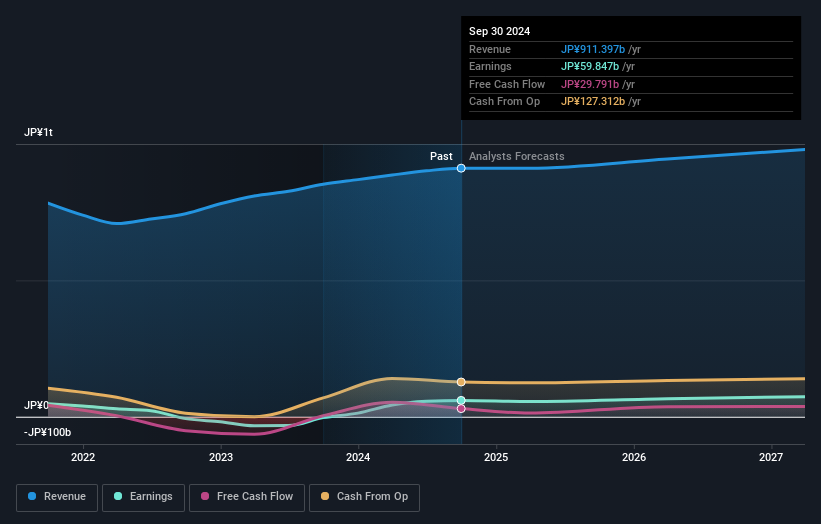- Japan
- /
- Basic Materials
- /
- TSE:5233
With 50% ownership of the shares, Taiheiyo Cement Corporation (TSE:5233) is heavily dominated by institutional owners

Key Insights
- Given the large stake in the stock by institutions, Taiheiyo Cement's stock price might be vulnerable to their trading decisions
- A total of 25 investors have a majority stake in the company with 48% ownership
- Using data from analyst forecasts alongside ownership research, one can better assess the future performance of a company
Every investor in Taiheiyo Cement Corporation (TSE:5233) should be aware of the most powerful shareholder groups. The group holding the most number of shares in the company, around 50% to be precise, is institutions. Put another way, the group faces the maximum upside potential (or downside risk).
Because institutional owners have a huge pool of resources and liquidity, their investing decisions tend to carry a great deal of weight, especially with individual investors. As a result, a sizeable amount of institutional money invested in a firm is generally viewed as a positive attribute.
Let's take a closer look to see what the different types of shareholders can tell us about Taiheiyo Cement.
Check out our latest analysis for Taiheiyo Cement

What Does The Institutional Ownership Tell Us About Taiheiyo Cement?
Institutional investors commonly compare their own returns to the returns of a commonly followed index. So they generally do consider buying larger companies that are included in the relevant benchmark index.
Taiheiyo Cement already has institutions on the share registry. Indeed, they own a respectable stake in the company. This implies the analysts working for those institutions have looked at the stock and they like it. But just like anyone else, they could be wrong. If multiple institutions change their view on a stock at the same time, you could see the share price drop fast. It's therefore worth looking at Taiheiyo Cement's earnings history below. Of course, the future is what really matters.

Institutional investors own over 50% of the company, so together than can probably strongly influence board decisions. We note that hedge funds don't have a meaningful investment in Taiheiyo Cement. Looking at our data, we can see that the largest shareholder is Marathon Asset Management Limited with 7.9% of shares outstanding. With 6.7% and 4.4% of the shares outstanding respectively, T. Rowe Price Group, Inc. and Nomura Asset Management Co., Ltd. are the second and third largest shareholders.
Our studies suggest that the top 25 shareholders collectively control less than half of the company's shares, meaning that the company's shares are widely disseminated and there is no dominant shareholder.
While it makes sense to study institutional ownership data for a company, it also makes sense to study analyst sentiments to know which way the wind is blowing. There are plenty of analysts covering the stock, so it might be worth seeing what they are forecasting, too.
Insider Ownership Of Taiheiyo Cement
While the precise definition of an insider can be subjective, almost everyone considers board members to be insiders. Company management run the business, but the CEO will answer to the board, even if he or she is a member of it.
Most consider insider ownership a positive because it can indicate the board is well aligned with other shareholders. However, on some occasions too much power is concentrated within this group.
Our most recent data indicates that insiders own less than 1% of Taiheiyo Cement Corporation. It's a big company, so even a small proportional interest can create alignment between the board and shareholders. In this case insiders own JP¥488m worth of shares. It is always good to see at least some insider ownership, but it might be worth checking if those insiders have been selling.
General Public Ownership
The general public, who are usually individual investors, hold a 50% stake in Taiheiyo Cement. This size of ownership, while considerable, may not be enough to change company policy if the decision is not in sync with other large shareholders.
Next Steps:
While it is well worth considering the different groups that own a company, there are other factors that are even more important. Consider risks, for instance. Every company has them, and we've spotted 1 warning sign for Taiheiyo Cement you should know about.
Ultimately the future is most important. You can access this free report on analyst forecasts for the company.
NB: Figures in this article are calculated using data from the last twelve months, which refer to the 12-month period ending on the last date of the month the financial statement is dated. This may not be consistent with full year annual report figures.
Valuation is complex, but we're here to simplify it.
Discover if Taiheiyo Cement might be undervalued or overvalued with our detailed analysis, featuring fair value estimates, potential risks, dividends, insider trades, and its financial condition.
Access Free AnalysisHave feedback on this article? Concerned about the content? Get in touch with us directly. Alternatively, email editorial-team (at) simplywallst.com.
This article by Simply Wall St is general in nature. We provide commentary based on historical data and analyst forecasts only using an unbiased methodology and our articles are not intended to be financial advice. It does not constitute a recommendation to buy or sell any stock, and does not take account of your objectives, or your financial situation. We aim to bring you long-term focused analysis driven by fundamental data. Note that our analysis may not factor in the latest price-sensitive company announcements or qualitative material. Simply Wall St has no position in any stocks mentioned.
About TSE:5233
Taiheiyo Cement
Engages in the cement, mineral resources, environmental, construction materials, and other businesses in Japan and internationally.
Undervalued established dividend payer.
Similar Companies
Market Insights
Community Narratives



